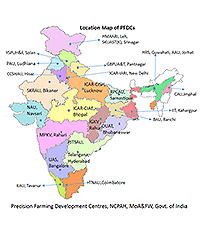What is NCPAH?
National Committee On Precision Agriculture & Horticulture (NCPAH) is constituted in the Ministry of Agriculture (MOA), Govt. of India to focus in a coordinated manner to popularize adoption of various plasticulture applications in horticulture & over all development of plasticulture applications in the country.
What is PFDC?
Precision Farming Development Centres (PFDCs) been established in India to promote “Precision Farming & Plasticulture Applications for hi-tech horticulture†and located in State Agricultural Universities (SAUs); ICAR Institutes such as IARI, New Delhi; CIAE, Bhopal & CISH, Lucknow and IIT, Kharagpur. Presently 22 PFDC have been operating to promote various plasticulture applications in horticulture by undertaking Trials, Demonstrations in state focused crops, Workshops / Seminar, Transfer of Technology through training & awareness programmes, use of Radio / TV programmes, Publications etc in different agriculture climate zones of the country.
Government Schemes?
- NMMI?
National Mission on Micro Irrigation (NMMI) is a centrally sponsored scheme implemented by the Ministry of Agriculture (MoA), GoI since 2005-06 to promote use of Drip / Sprinkler Irrigation Systems in the country.
- NHM?
National Horticulture Mission (NHM) has been launched during the year 2005-06 as a Centrally Sponsored Scheme to promote holistic growth of the horticulture through area based regionally differentiated integrated approach of water management, protected cultivation, nutrition & pest management, post harvest, processing & marketing.
- HMNH?
In order to improve the improve livelihood opportunities and bring prosperity to the North Eastern Region (NER) including Sikkim; Government of India has launched Technology Mission (TM), which is now known as Horticulture Mission for North East and Himalayan States (HMNH). The Mission is based on the "end to end approach" taking into account the entire gamut of Horticulture development, with all the backward and forward linkages, in a holistic manner.
- RKVY?
National Development Council (NDC), resolved that a special Additional Central Assistance Scheme know as Rashtriya Krishi Vikas Yojana (RKVY) be launched during 2007. The scheme would focus on agricultural development strategies reoriented to meet the needs of farmers and called upon the Central and State governments to evolve a strategy to rejuvenate agriculture.
- NFSM and ISOPOM?
The National Development Council (NDC) during 2007 launched a Centrally Sponsored Scheme, 'National Food Security Mission' comprising rice, wheat & pluses to increase the production of rice by 10 million tons, wheat by 8 million tons & pulses by 2 million tons by the end of the eleventh five year plan (2011-12. The National Food Security Mission will have 3 components (i) Rice (ii) Wheat & (iii) Pulses.
In order to provide flexibility to the States in implementation based on regionally differentiated approach, to promote crop diversification and to provide focused approach to the programmes, Centrally Sponsored Integrated Scheme of Oilseeds, Pulses, Oil palm and Maize (ISOPOM) being implemented from 2004
Precision Farming?
Precision farming or precision agriculture is about doing the right thing, in the right place, in the right way, at the right time. The intent of precision farming is to match agricultural inputs and practices as per crop and agro-climatic conditions to improve the accuracy of their applications.
Plasticulture?
Plasticulture represents use of applications of plastics in Agriculture, Horticulture, Water management & related areas. Plasticulture applications offer a multitude of benefits and are considered most important indirect agricultural inputs which results moisture conservation, water saving, reduction in fertilizer consumption, helps in precise application of water & nutrients, controlled environment agriculture is economically viable, plant protection through the use of nets and use of innovative packaging solutions help in increasing shelf-life and during collection, storage & transportation of fruits and vegetables.
Why Plasticulture?
Plasticulture applications are considered the most important indirect agriculture input which results in moisture conservation, water saving, reduction in fertilizer consumption, helps in precise application is economically viable, plant protection through the use of nets and use of innovative packaging solutions help in increasing shelf-life and during collection, storage and transportation of fruits and vegetables.
Different type of Plasticulture Applications?
Broad Classification of plasticulture applications are as follows.
Water management :
- Lining of canals, ponds & reservoirs with plastics film
- Drip & Sprinkler Irrigation
- PVC & HDPE pipes used for water conveyance
- Sub-surface Drainage
Nursery Management :
- Nursery bags, Pro-trays, Plastic plugs, Coco-pits, Hanging baskets, Trays etc
Surface cover cultivation :
- Soil Solarisation
- Plastics Mulching
Controlled environment agriculture :
- Greenhouses
- Shade net houses
- Low tunnels
- Plant Protection nets
Innovative Packaging :
- Plastics crates, bins, boxes, leno bags, unit packaging products etc
- CAP Covers, Controlled Atmospheric Packaging(CAP) & Modified Atmospheric
- Packaging (MAP)
Advantages of plastic in Agriculture ?
The unique advantages of plastic over conventional materials are:
- Higher strength/weight ratio
- Superior thermal insulation properties
- Excellent corrosion resistance
- Superior flexibility
- Resistance to most of the chemicals
- Excellent moisture barrier properties
- Favourable gas permeability.
- Smooth surface – resulting in reduction in friction losses
- Excellent light transmissibility
- Helps to enhance shelf-life of the produces
- Better visibility of the produce
What is Canopy Management?
Canopy management is the manipulation of tree canopies to optimize the production of quality fruits. The canopy management, particularly its components like tree, training and pruning, affects the quantity of sunlight intercepted by trees, as tree shape determines the presentation of leaf area to incoming radiation.
Some of the basic principles in canopy management are:
- maximum utilization of light
- avoidance of built-up microclimate congenial for diseases and pest infestation
- convenience in carrying out the cultural practices
- maximizing productivity with quality fruit production
- economy in obtaining required canopy architecture




